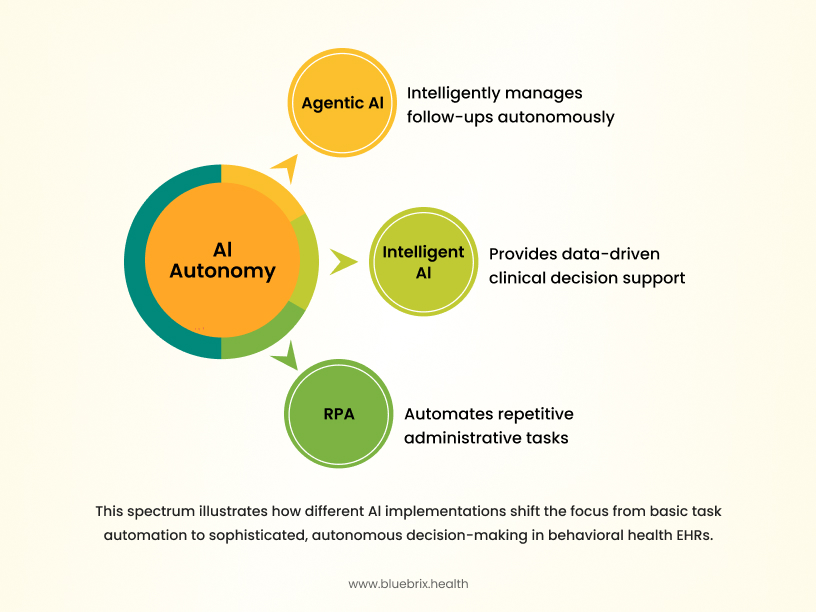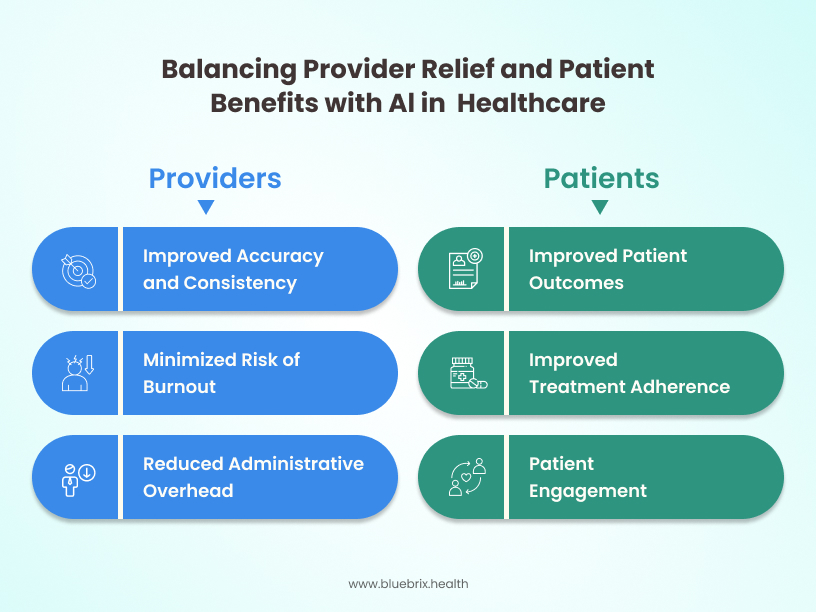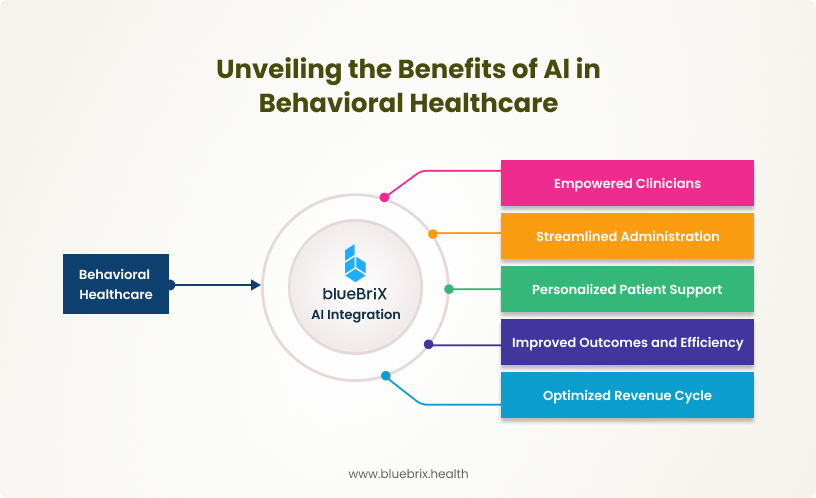You understand the complexities of mental healthcare, the nuances of addiction treatment, and the critical importance of personalized support. What if there was a technology that could help you achieve these goals more effectively than ever before? This blog gives you a sneak peek into how an AI-integrated Behavioral Health EHR purpose-built for your unique requirements help personalize care and drive better outcomes.

As a decision-maker in the challenging yet rewarding field of behavioral health in the US, you’re constantly seeking ways to enhance patient outcomes, streamline operations, and empower your dedicated team. Over 70% of behavioral health providers report that administrative tasks interfere with their ability to deliver quality care. The answer lies in the intelligent integration of Artificial Intelligence (AI) into your behavioral health EHR. It’s not just about fancy algorithms and futuristic jargon; it’s about leveraging the power of data and intelligent automation to transform the way you deliver care. Imagine an EHR that not only stores patient information but also actively assists in clinical decision-making, automates time-consuming tasks, and even anticipates potential challenges before they arise.
This isn’t a distant dream; it’s the reality that a modern behavioral health EHR with seamless AI integration can offer. Let’s explore how this powerful synergy can transform your practice.
Robotic Process Automation (RPA) in Behavioral Health: Reclaiming Time, One Task at a Time
We all know that behavioral health providers and administrative staff often grapple with a significant administrative burden. Repetitive, manual tasks can drain valuable time and energy that could be better spent focusing on patient care. This is where Robotic Process Automation (RPA) integrated within your behavioral health EHR steps in as a game-changer.
Think about the countless hours spent on tasks like:
- Automating Appointment Reminders: Reducing no-shows and improving patient engagement through automated reminders via various communication channels.
- Streamlining Prescription Refills: Automating the refill process based on pre-defined protocols and patient history, minimizing errors and saving staff time.
- Managing Insurance Authorizations: Automating the initial stages of authorization requests, flagging potential issues, and ensuring timely approvals.
- Generating Routine Reports: Automatically compiling necessary reports for compliance and internal analysis, freeing up administrative staff.
Automating appointment reminders alone can reduce no-show rates by up to 30%. By taking over these mundane, high-volume processes and executing them with accuracy and consistency, RPA within a behavioral health EHR allows your team to focus on what truly matters: providing compassionate and effective care.

Agentic AI: Intelligent Automation for Complex Follow-ups
Moving beyond basic automation, Agentic AI within a behavioral health EHR introduces a layer of intelligent autonomy to more complex activities. Unlike RPA, which follows pre-programmed rules, Agentic AI can make decisions and take actions based on specific, known parameters without constant human oversight.
Consider the critical aspect of patient follow-up, especially in challenging cases like addiction recovery. An behavioral health EHR equipped with Agentic AI could:
- Proactive Check-ins Based on Milestones: Automatically schedule and initiate follow-up communications based on a patient’s progress in their smoking cessation program, for example. This could involve personalized messages of encouragement, reminders of coping strategies, or prompts to schedule additional support sessions.
- Risk-Based Intervention Triggers: If a patient’s data within the behavioral health EHR indicates a potential increase in relapse risk (e.g., missed appointments, negative sentiment analysis from check-in responses), the Agentic AI could automatically trigger alerts for the provider and initiate supportive outreach to the patient.
- Coordinating Care Based on Specific Needs: For patients with co-occurring disorders, Agentic AI can help coordinate communication and scheduling between different specialists involved in their care, ensuring a holistic and integrated treatment approach.
This level of intelligent automation ensures consistent and timely follow-up, a cornerstone of successful behavioral health outcomes, without placing an unsustainable burden on your clinical staff.
Intelligent AI: Empathy, Personalization, and Proactive Comorbidity Prediction
At the forefront of AI integration in behavioral health EHR systems lies Intelligent AI. This goes beyond automation and delves into the realm of personalized decision-making, mirroring the nuanced judgment a human clinician would employ.
Imagine a behavioral health EHR that can:
- Tailor Treatment Strategies: Based on a patient’s comprehensive history, progress data, and even subtle cues from their interactions (analyzed through natural language processing), Intelligent AI can suggest personalized treatment approaches, whether it’s adjusting therapy techniques, recommending specific support groups, or suggesting modifications to medication regimens.
- Empathetic and Consistent Engagement: AI-powered chatbots integrated within the behavioral health EHR can provide consistent and empathetic support to patients, answering their questions, offering coping strategies, and reinforcing positive behaviors – all without the risk of burnout or emotional fatigue that human providers can experience. Think of a patient struggling with cravings late at night; an AI companion can offer immediate, evidence-based support.
- Predicting and Proactively Intervening on Comorbidities: This is a particularly powerful application of Intelligent AI. According to Substance Abuse and Mental Health Services Administration (SAMHSA), patients with co-occurring disorders are 2.5 times more likely to experience treatment delays without proactive intervention. By analyzing vast amounts of patient data within the behavioral health EHR, AI algorithms can identify patterns and predict the likelihood of developing co-occurring mental health conditions or physical health issues which is typical of behavioral health patients. For instance, AI might identify a patient in addiction recovery who is at a higher risk of developing depression based on specific data points. This early prediction allows for proactive interventions, integrated treatment plans, and potentially better long-term outcomes. Similarly, a behavioral health patient with eating disorder and obesity can be at high-risk of diabetics. Intelligent AI can intervene proactively in such cases to prevent escalations.
This intelligent layer of AI empowers your clinicians with data-driven insights, allowing them to make more informed decisions and deliver truly personalized care that addresses the unique needs of each patient.
Easing Provider Burden, Improving Outcomes & Streamlining Revenue: The Synergistic Power of AI and EHRs
The integration of RPA, Agentic AI, and Intelligent AI within a comprehensive behavioral health EHR isn’t just about technological advancement; it’s about fundamentally improving the lives of both your patients and your providers.

Clinician burnout affects over 60% of mental health professionals. AI-driven automation has been shown to reduce documentation time by up to 45%. By automating administrative tasks, intelligently managing follow-ups, and providing data-driven clinical decision support, AI significantly eases the operational burden on your team. This translates to:
- Reduced Administrative Overhead: Allowing clinicians and staff to spend more time on direct patient care.
- Minimized Risk of Burnout: By taking over repetitive and demanding tasks, AI helps protect your valuable workforce.
- Improved Accuracy and Consistency: AI-powered systems perform tasks with precision and without the variability of human error.
- Enhanced Patient Engagement: Proactive and personalized communication fosters stronger patient-provider relationships.
- Better Treatment Adherence: Consistent follow-ups and personalized support increase the likelihood of patients sticking with their treatment plans.
- Improved Patient Outcomes: By delivering more timely, personalized, and coordinated care, an AI-integrated behavioral health EHR paves the way for better recovery and well-being for your patients.
- Optimized Revenue Cycle: AI-driven automation ensures precise and accurate claims, streamlining workflows and optimizing your revenue cycle. AI chatbots can also lead to speedier reimbursements and increased cash flow.
- Increased Access and Strengthened Performance: Cutting-edge AI technologies embedded in behavioral health EHRs enhance access and strengthen performance across the entire ecosystem of care.
Choosing the Right Path: The Power of an Integrated, Purpose-Built EHR
While third-party AI solutions can be integrated with existing EHRs, the most seamless and effective way to harness the power of AI is through a behavioral health EHR that is purpose-built with AI integration at its core.
Think of blueBriX, a platform designed specifically for the complexities of behavioral healthcare. By building AI capabilities directly into the workflow, blueBriX offers a unified and intuitive experience. This deep integration ensures that AI-powered tools work harmoniously with your clinical and administrative processes, maximizing efficiency and impact. From AI-assisted documentation to intelligent clinical decision support and revenue cycle management, a purpose-built behavioral health EHR like blueBriX can provide a significant advantage in delivering truly personalized and effective care.
The Time for Transformation is Now
The landscape of behavioral healthcare is evolving rapidly, and AI is no longer a futuristic concept – it’s a present-day necessity for organizations looking to thrive and provide the best possible care. By embracing a behavioral health EHR with intelligent AI integration, you’re not just adopting a new technology; you’re investing in a future where:
- Your clinicians are empowered with data-driven insights.
- Your administrative teams are freed from tedious tasks.
- Your patients receive truly personalized and proactive support.
- Your organization achieves better outcomes and operational efficiency.
- Your organization’s revenue cycle optimization peaks effectiveness.

Don’t let your practice fall behind. It’s time to explore how a modern, AI-integrated behavioral health EHR can transform your organization and elevate the standard of care you provide.
Ready to unlock the full potential of AI for your behavioral health practice? Contact us today for a personalized demo of blueBriX and discover how our purpose-built, AI-powered behavioral health EHR can help you achieve better outcomes, streamline operations, and empower your team like never before.